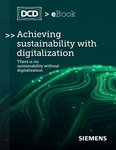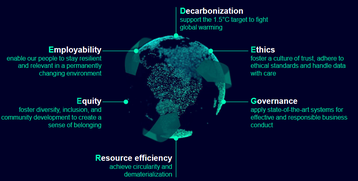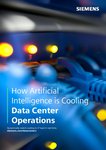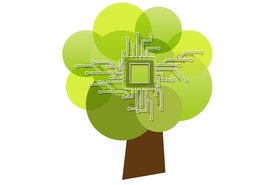Colocation data center operators are at a crossroads. Demand for their services is increasing at an exponential rate. Workloads are growing and changing, thanks to the boom in AI and machine learning. Yet, at the same time, customers of colo are increasing their demands around Environmental, Social, and Corporate Governance (ESG). As regulation and public demand for social and environmental responsibility is pushed on the client, it’s being passed on to their suppliers.
But how does the data center account for its responsibilities in a reliable, tangible, and authoritative way, especially over multiple sites? Ciaran Flanagan, global head of sales, data center verticals at Siemens, tells us about how the company is tackling that issue head-on.
“The shift into the ESG narrative for the data center industry started six or seven years ago and in the last two or three years, it's picked up pace. Colocation providers have had to respond, as they're expected to be ESG responsible.”
As Flanagan points out, the challenges to the colo market are distinct and manifest. He tells us: “There are specific issues that the colocators face. One is that they're often in cities and urban settings. The practicality of making things happen in a city because of space, or because of the nature of the energy supply provides extra barriers. Plus, colocaters have a much broader set of stakeholders with expectations, and trying to marry all of those can make ESG progress a little more complex.”
“In the last few years, colocation providers have come to the conclusion that by being open and transparent on where they are today and want to be tomorrow, they can have a much more constructive discussion with their stakeholders. Then they can come to technology providers like Siemens, and say ‘We've got these ESG objectives, how can you help?’ I like to break it down clearly into three buckets: Measure, Manage, and Mitigate. The three Ms.”
Flanagan breaks down these three concepts like this: “‘Measure’ whether the colocation operator has the necessary control systems, measurement systems, and telemetry data to baseline where they're at today. Do they know where they're at today? Can they share that with their stakeholders? Can they give a picture of their ESG compliance today? The answer is usually mixed across different types of colocators, facilities, and geographies because the requirements for each are different.
Decarbonization starts with data. “‘Managing.’ Once you've baselined your sustainability performance, which covers more than just energy – it's waste recycling, water usage, social impact, electricity, carbon, and so on, then it becomes a question of, ‘What can you do to start to manage that performance to improve?
Things like energy efficiency programs, influencing energy mix, recycling, water recycling, consumables at the site, and engaging with the social community all matter to ESG performance. You may find that you've got to retrofit or change some practices, but now you've baselined, you’re able to come up with a set of actions that improve the metrics or the KPIs that you're looking into.
“‘Mitigate.’ For example, to reduce the carbon intensity of our power supply can we go to PPAs? Do we do on-site generation? Can we engineer out the need to use water? Can we recycle all of the IT equipment? It becomes a much more fundamental change in how the operation has been run, and how future colocation sites are being built.”
So where does Siemens come into the picture? When it comes to ESG, Siemens has built what it calls the DEGREE framework, to ensure that it offers a holistic approach, with end-to-end coverage. Flanagan talks us through the acronym:
Decarbonization
“We are driving out carbon from our manufacturing process, our design process and making recycling and reuse of our products part of our decarbonization approach. We're not saying that we can produce everything with zero carbon today, but we're on a journey to incrementally improve it over time.
“We're also focused on addressing it as part of our manufacturing process, so we can talk about reducing our scope impact as well. It’s absolutely the intention of Siemens, and to be fair, our competitors to drive carbon out of the lifecycle of our products. Our recent Ecodesign whitepaper is a good way to progress this dialogue.”
Ethics
“Ethics is a very important part of sustainability. We want to do what is ethically correct, we don't want to introduce conflict or poor visibility into our business activities. To do this we actively promote a culture of trust, adhere to ethical standards and handle data with care. We don’t want a future of winners and losers and we believe by acting ethically we support a more sustainable future.”
Governance
“We work to provide visibility into what's going on in our supply chains and our operations. We make sure the governance model has accurate and real-time performance information so the business can make the decisions it needs to make. You cannot improve the ESG performance of your operation unless you know where your baseline is today. We encourage all our suppliers to commit to our supplier code of conduct.”
Resource efficiency
“This is all about minimizing scarce resources, and the use of fossil fuels, and that we design for sustainability. We design our products in a way that they can be easily recycled. When we look at our product, we start to measure how much of the physical product is going to end up in landfill. The idea is that we continually drive that number down by designing the product in a way that it can be easily either recycled or easily recommissioned. We call this eco-design.”
Equity
“Customers are looking for us to demonstrate diversity. In our workforce, they're looking for us to demonstrate good working practices in our factories, the inclusion of different ethnicities, sexuality, disabilities, and all of the different facets of the workforce today, and that we maintain a high level of commitment to being an equitable employer. And equitable employer is a basic expectation for a sustainable employer.”
Employability
“What are we doing to make sure that we're positioning our workforce to be digital, and to be able to participate in the digital economy? How much training are we doing? How safe is our workforce in the factory?
Employability is a big part of the sustainable development goals and it's something we measure ourselves on, and a lot of our competitors and suppliers do so as well.”
That’s the plan on paper, but what is Siemens offering to make this a reality? Flanagan talks about two major solutions designed to offer a flexible and scalable solution for colocation operators: “We launched our Siemens Xcelerator platform two years ago, to help our customers digitize operations, make things intuitively software-driven and provide tools and utilities to improve the effectiveness of our clients’ operations teams.
“In the past, we would have operations people going to switch rooms with clipboards and reading meters. Different circuits in a data center would operate differently and require manual intervention. We are moving to a new world of digital operations with better accountability, better access to information and a new richness in the role of operations teams.
“We use a Digital Twin approach which we call ‘Building X.’ This offers a suite of dashboards and tools that allow our customers to better control their operations and deploy service-based capabilities to enable more value-added features within their existing infrastructure. As a customer scales up they can scale the operations reach more effectively through automation, visualization and data management.
“Both Siemens Xcelerator and Digital Twin will help our clients to measure their ESG performance, manage the infrastructure to drive improvements and finally model and anticipate the mitigations to embed long term sustainability improvements.”
The Siemens message is clear – technology is an enabler for meeting colo customer needs in the realities of the 21st Century.
Or as Flanagan puts it: “We contend that digitalization and sustainability go hand in hand. To be truly sustainable, you've got to digitize your operations because that's where you find operational efficiencies, which lead to better sustainability.”






